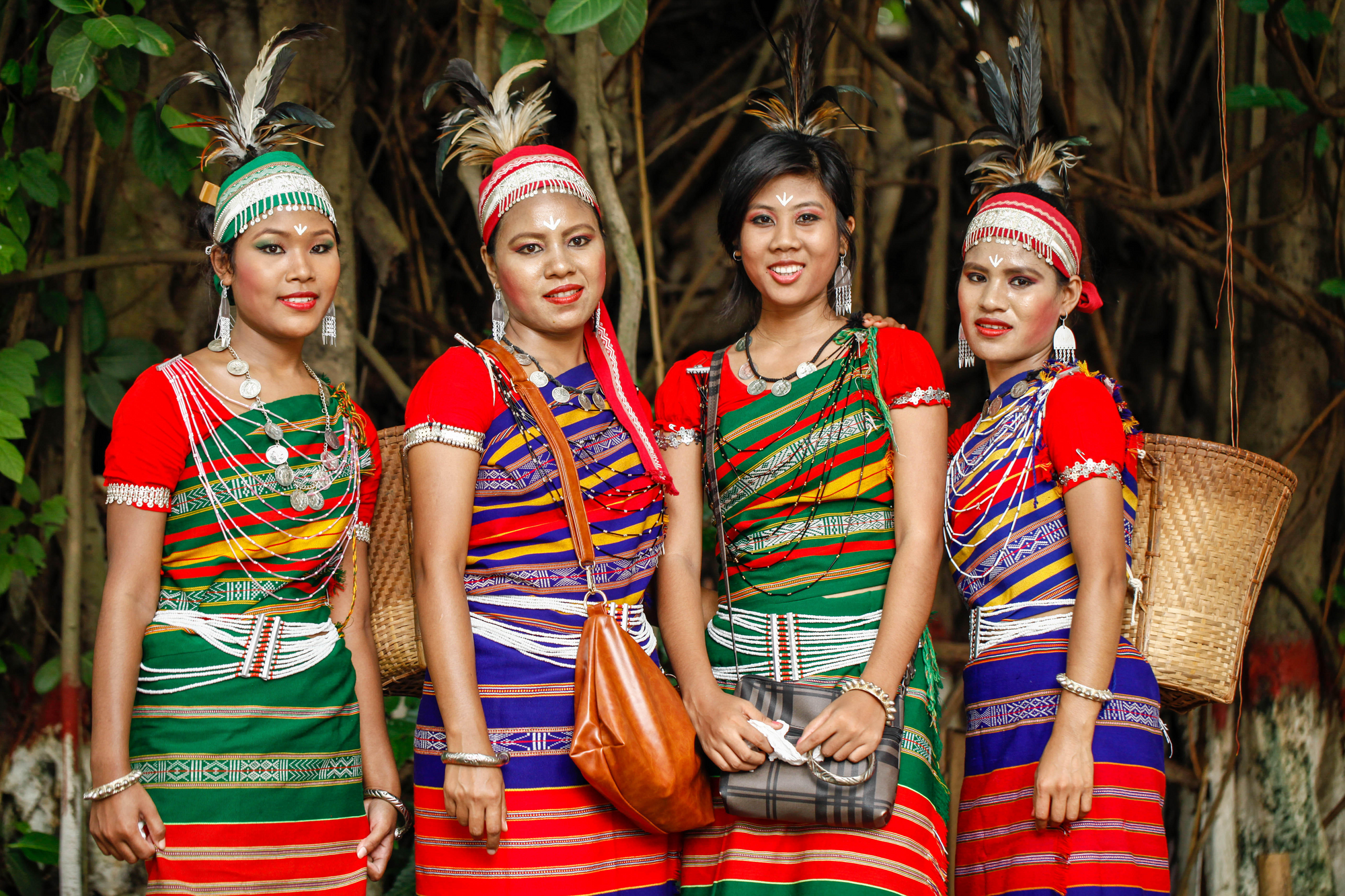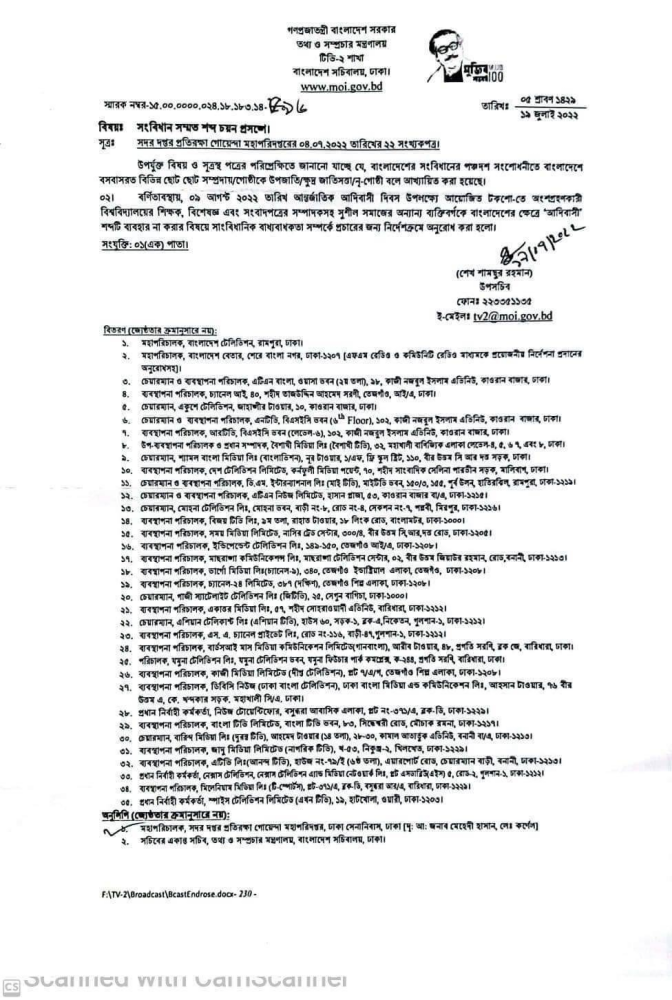Censoring the indigenous
Bangladesh’s information ministry orders television stations not to use the term “indigenous” to describe the ethnic communities in the country.

Bangladesh’s information ministry has asked all television stations to refrain from using the term “indigenous” to describe the ethnic communities in the country. Citing a letter issued by the Directorate General of Forces Intelligence (DGFI), the ministry has issued the directive ahead of the International Day of the World's Indigenous Peoples on August 9th.
“In the context of the [DGFI] letter, it is noted that the 15th amendment to the Bangladesh constitution describes minor communities or groups living in Bangladesh as the tribes, minor races, ethnic sects, and communities,” the letter reads. “Under the circumstances described above, members of the civil society including university faculty members, experts, and newspaper editors participating in talk-shows commemorating the international indigenous day are requested to refrain from using the term, indigenous, and be aware of relevant constitutional obligations.”
The information ministry sent the letter, dated July 19th and signed by Sheikh Shamsur Rahman, a deputy secretary, to all major TV stations. Rahman confirmed to Netra News that he signed the letter but refused to comment on it.

Bangladesh’s constitution does not impose a restriction on the use of the term “indigenous”. Section 23A of the constitution merely states, “the state shall take steps to protect and develop the unique local culture and tradition of the tribes, minor races, ethnic sects, and communities.”
Bangladesh government has long insisted that the word “indigenous” should not be used to describe the country’s ethnic populations, like the Chakmas and the Marmas, a large portion of whom live in the Chittagong Hill Tracts (CHT), where the Bangladesh military has long had a heavy presence. It argues that the ethnic groups, who see themselves as an indigenous people, migrated to Bangladesh and therefore cannot be considered as indigenous to the country.
In 2011, Dipu Moni, then the foreign minister, said, “Bangladesh does not have any indigenous population.”
A similar claim had repeatedly been echoed by the Bangladeshi delegation to the United Nations Permanent Forum on Indigenous Issues.
A year later, the Ministry of Local Government and Rural Development circulated a memo to promote the concept that “there are no indigenous people in Bangladesh.”
In 2015, Al Jazeera reported that DGFI officers instructed major Bangladeshi companies to stop advertising in two of the country’s leading newspapers, The Daily Star and Prothom Alo following a story they both had published on the army’s killing of five men in the Chittagong Hill Tracts. Army officials had contacted both papers and criticised them for describing the dead men as “indigenous” people instead of “terrorists”.
Bangladesh’s military establishment, which has had a decades-long bloody presence in the CHT, has been staunchly opposed to the signing of the International Labor Organization’s Convention 169, enacted in 1991, which is a binding instrument that recognises the rights and “self-determination” of indigenous people.
In the years since the Awami League returned to power in 2009, former military officers and academics popularised a fringe legal theory that sought to delegitimise even the use of the word “indigenous,” arguing that it was extra-constitutional and thus prohibited.
In opposition, the Awami League vowed to recognise the constitutional rights of the indigenous people in Bangladesh — only to backtrack from its promises once in power.
The centre-right opposition, the Bangladesh Nationalist Party (BNP), generally seen as a pro-military party founded by a former army general, has supported the government on this issue.
But the Awami League’s anxieties about the idea of multiculturalism in Bangladesh date back to the 1970s. Following the independence of the country, the party chief and president, Sheikh Mujibur Rahman, also known as the Friend of Bengal (Bangabandhu) and the pioneer of Bengali nationalism, sought to assimilate indigenous culture and identities into Bengali nationalism.
“No, we are all Bengalis; we cannot have two systems of government. Forget your ethnic identity, be Bengalis,” Sheikh Mujibur Rahman, also known as Mujib, is widely claimed to have told Manabendra Narayan Larma, then a member of parliament from the Chittagong Hill Tracts, who demanded greater self-determination for the indigenous communities that he represented.
Larma would soon wage an insurgency against the Bangladesh government, leading a large group of indigenous rebels.
Mujib’s daughter Sheikh Hasina, who came to power in 1996, signed a peace treaty in 1997 with the rebels — much to the dismay of the military establishment. The former rebels now allege that the government has not honoured its promises in implementing the peace treaty, while the military and its intelligence branch continue to dominate the CHT and, among others, the media.●